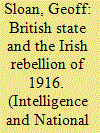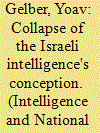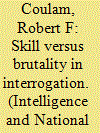|
|
|
Sort Order |
|
|
|
Items / Page
|
|
|
|
|
|
|
| Srl | Item |
| 1 |
ID:
123176


|
|
|
|
|
| Publication |
2013.
|
| Summary/Abstract |
The teleological narrative that has dominated the handling of intelligence by the British state in the events that led up to the 1916 Irish Rebellion in Dublin has been characterised as a cocktail of incompetence and mendacity. Using new and existing archive material this article argues that both the cabinet in London and key members of the Irish Executive in Dublin were supplied with accurate and timely intelligence by the Admiralty's signals intelligence unit, the Royal Irish Constabulary and the Dublin Metropolitan Police with respect to this event. Far from being a failure of intelligence here is evidence to show that there occurred a failure of response on behalf of key decision-makers. The warnings that were given by intelligence organisations were filtered through the existing policy preferences and assumptions. As a result of these factors accurate evaluations and sound judgement were not exercised by key officials, such as Sir Matthew Nathan, in Dublin Castle.
|
|
|
|
|
|
|
|
|
|
|
|
|
|
|
|
| 2 |
ID:
123178


|
|
|
|
|
| Publication |
2013.
|
| Summary/Abstract |
This article attempts to contradict the commonly accepted assumption in Israel and the West that in April-May 1973 Egypt and Syria were about to open war against Israel and were deterred by a series of measures that Israel took, including partial mobilization of the Israel Defence Force (IDF) reserves. The article ventures to separate the apologetics and (flawed) memories from the information provided by the now available documentary evidence. After presenting the prevailing Israeli version, the article analyses the memoirs on the Egyptian side about the preparations for war and determining D-Day, to refute this version. Based on the contemporary protocols of government and general staff meetings and political-military consultations, it argues that the Israeli government, general staff and intelligence community did not regard at the time the outbreak of war as an imminent threat. The steps they took concerned the medium and long run, and were irrelevant in the short run. Similarly, the mobilization of reserves was not connected to the alarm of war but to the Day of Independence parade in Jerusalem. The article claims on the basis of these protocols that the reason for the excitement was the collapse of the Israeli intelligence's conception that Egypt would not resume hostilities before it could hit at the interior of Israel, and Syria would not go to war without Egypt. The arrival of Libyan Mirages and Iraqi Hunters to Egypt in April fulfilled this condition and the possibility of war could not be dismissed offhand. Israel responded to the new situation by the book. It shared the information and analysis with the White House and the CIA; it refreshed the IDF planning down to the divisional level and the IDF general staff held a series of thorough discussions to estimate the situation. The bottom line of this process was a government directive to the IDF to prepare for war at the end of the summer of 1973 (as it actually happened). In the latter portion of the article I explain why this directive was ignored when it was put to test in late September and early October of 1973.
|
|
|
|
|
|
|
|
|
|
|
|
|
|
|
|
| 3 |
ID:
123179


|
|
|
|
|
| Publication |
2013.
|
| Summary/Abstract |
The 9/11 attacks and the subsequent increase of counterterrorism laws and regulations in Western democracies have also spurned heavy debates on torture and ill-treatment of captured terrorist suspects. However, while the Netherlands did deploy troops to Afghanistan and adopted new laws and policies regarding counterterrorism, debates on torture remained marginal. Indeed, the Netherlands has not suffered the pressure of a constant high terrorist threat, or endured a catastrophic terrorist attack. However, the author argues that there are more reasons for the lack of heated discussions. While this article does not intend to lift the Dutch case to an exemplary one, it illustrates how Dutch government authorities made good use of the benefits of hindsight regarding torture debates and incidents elsewhere and were able to apply lessons regarding accountability and oversight concerning interrogation issues at home successfully.
|
|
|
|
|
|
|
|
|
|
|
|
|
|
|
|
| 4 |
ID:
123177


|
|
|
|
|
| Publication |
2013.
|
| Summary/Abstract |
While the role of intelligence is to reduce uncertainty for decision-makers, a role of intelligence scholarship is to highlight uncertainty, that is, open up possibilities for ethical reflection and deliberation that conventional wisdom, institutional inertia, and mainstream research have closed off. Along these lines, this essay argues for the development and use of rhetorical and critical/cultural perspectives within the field of Intelligence Studies. It describes what rhetorical and critical/cultural research entails and explains how associated perspectives benefit the field.
|
|
|
|
|
|
|
|
|
|
|
|
|
|
|
|
| 5 |
ID:
123180


|
|
|
|
|
| Publication |
2013.
|
| Summary/Abstract |
This article reviews the central tenets of selection, training, doctrine, and organization in Israeli interrogation to suggest how the United States might learn from the Israeli experience. There is relatively little in the open literature on these particular issues of training and approach in Israel. The contrast between Israeli and US approaches raises questions about the effectiveness of US interrogation and suggests how the US might better use skill and cunning toward an effective, legal, and ethical American policy on interrogation. By themselves, professionalism and skill do not prevent torture, but they can provide an effective alternative to it. A change in American policy is essential, to counter pressures in Congress and elsewhere to sanction the use of torture in response to new terrorist threats.
|
|
|
|
|
|
|
|
|
|
|
|
|
|
|
|
|
|
|
|
|